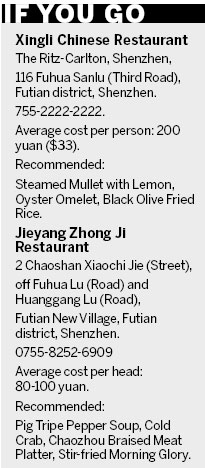
The mullet is a white fish and most of its oil reserves are found in its stomach. Steaming it with lemon adds both fragrance and flavor and this is a time-tested method favored by Chaozhou chefs.
Next up is an arrangement of deep-fried tofu and squid fritters, a variation of the fish paste. It was hard to decide which was better. The squid croquettes sprang back from the teeth and were declared a universal favorite by all at the table, but the tofu was like Cinderella at the ball.
The simplest is usually the hardest to do well, and the tofu wedges got my vote. Light and crisp on the outside, the fried tofu fritters were juicy at first bite. Dipped into the vinegar, garlic and chili sauce, they were addictive.
My favorite among all of Chaozhou's well-known offerings is the oyster omelet and Xingli's version gets my vote. Every oyster was plump and sweet and the omelet was fluffy and well seasoned. Most of all, it did not leave a layer of oil on the palate.
Finally, the dish to recommend at Xingli would be the black olive fried rice, which can be a meal by itself. It is both light and savory and very satisfying. You don't see much meat in this dish, but that's because the taste of the preserved olives adds enough robustness to the rice.
It is a shame that we do not see this dish too often at Chaozhou restaurants in China. In Thailand, olive fried rice is practically a national signature, along with tom yum soup, and it is all thanks to Chaozhou immigrants.
Good food prevails, and we can only count ourselves very fortunate that the current mobility around China has helped us reap unexpected epicurean rewards. Seize the day, or rather, the menu.
For more photos, here